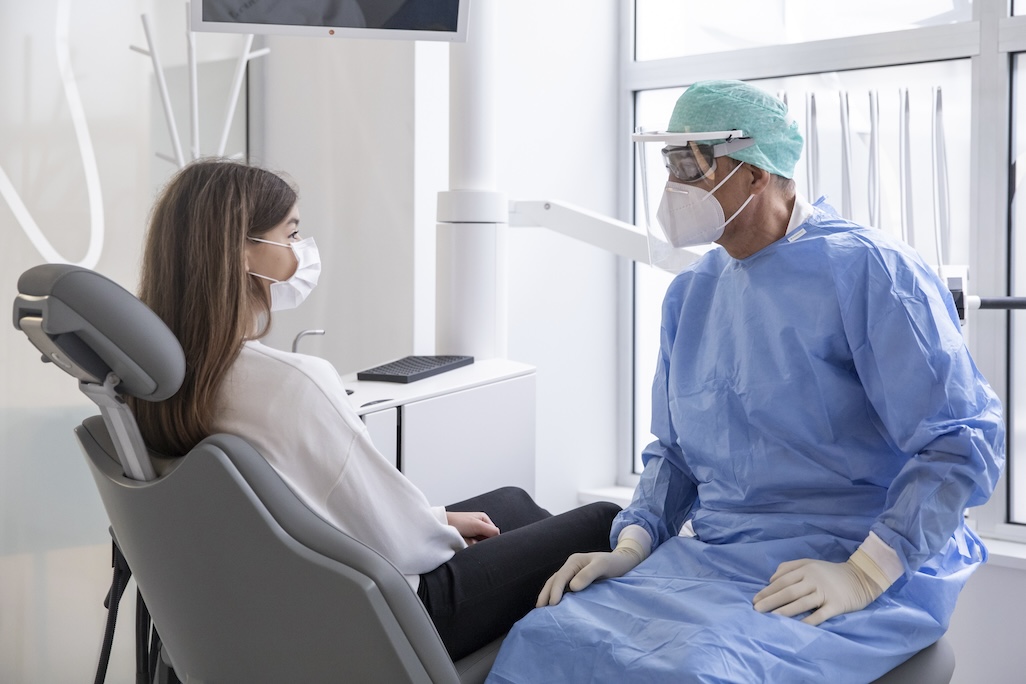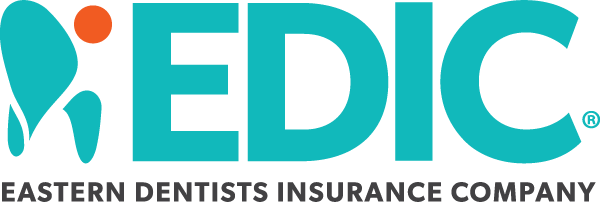COVID-19 Information & FAQs

Eastern Dentists Insurance Company (EDIC) recognizes the importance of providing our clients with trustworthy information that will protect both patients and dental health care personnel during this pandemic.
We encourage our clients to check the Centers for Disease Control and Prevention (CDC), the American Dental Association (ADA), state and local health departments, state dental societies, and other reputable sources for the most up-to-date information as well. Please continue to exercise your best professional judgment.
EDIC FREE Webinars*
*FREE Webinars are only available as an exclusive member benefit for EDIC insureds.
EDIC Archived Webinar Library: You will have to log in (either existing account or create a new account) to access the webinars. After logging in, click on the Webinars tab.
Recent webinar now available in the library
June 9, 2021
Infection Control and Guidance in the Aerosolized Pandemic
Participants will learn about
- Federal infection control guidelines
- CDC guidance and changes
- State of Massachusetts requirements
- Implementation of the compliance program
- Consequences of non-compliance
Presented by Howard J. Pactovis, DMD
Teledentistry Resources
Coverage and Risk Management Questions
The decision to reopen a dental office or remain closed, absent an overriding state or federal mandate, is a decision to be made by each individual dental practice. The following FAQs were developed to assist dentists in making that decision, as well as to encourage a concerted effort in making the reopening of dental offices the safest environment possible for patients, staff, and dentists.
The safety of patients, dentists, and dental team members is EDIC’s utmost concern.
Do Dentists Have to Treat Unvaccinated Patients?
Dentists are generally not legally obligated to accept unvaccinated patients into their care, nor are they required to retain them. Unvaccinated individuals are currently not a protected class under federal or state law, nor is being unvaccinated a recognized religious tenant, so practitioners are not prohibited from dismissing them.
The rules of patient abandonment still apply, however. Patients in active treatment or not medically stable may not be dismissed. Dentists must provide adequate notice and follow a formal dismissal protocol when dismissing unvaccinated patients from their practices. Dentists must also remain available for emergency treatment for a minimum of 30 days.
Additionally, remember that dentists have a legal and ethical obligation to treat patients who may have a disability, which may include those unable to be vaccinated. Consultation with the patient’s physician may be necessary. If the patient’s vaccination status hinges on a disability or because they belong to a protected class, it may be against the law to dismiss the patient.
Remember, legal considerations regarding vaccine status vary by jurisdiction and are evolving. If you have questions about what is legally permissible in your jurisdiction, please consult local counsel.
Can I administer the COVID-19 vaccine?
The administration of the COVID-19 vaccination by dentists has been approved by State Governors and State Boards of Dentistry in some states. If your state has added the administration of COVID-19 vaccinations to the definition of the practice of dentistry, then your EDIC malpractice policy will cover the vaccine administration that conforms to the regulations of your state.
Other provisions of your malpractice policy still apply. Remember that you may not give medical advice to your patients.
This information does not apply to dental hygienists.
Can I mandate that my dental team get the COVID-19 vaccine?
This is a question for an employment attorney. EDIC cannot comment on employment liability or workers compensation questions.
We expect our dentists to practice to the standard of care and follow all infection control protocols. The immune system status of dentists and dental team members is outside of the standard of care. Dentists should follow Federal, state, and local guidelines for appropriate COVID guidance, such as appropriate PPE, when personnel and patients should quarantine at home, how to screen patients, new infection protocols, etc.
The ADA has posted COVID-19 Vaccination Employer FAQs, which may be helpful in answering this question.
Can I administer the COVID-19 test before treatment to check the status of a patient?
Your policy provides coverage for dental health care services performed on a patient in your profession. It is not in EDIC’s purview to determine what is involved in your scope of practice – that’s set forth by your state Board of Registration, or the similar body that governs the practice of dentistry in your state. Your policy does not cover nondental procedures as described in your state’s dental practice act.
COVID-19 testing by dentists is being approved by State Boards of Dentistry in some states (e.g., North Carolina). If your state legislature or state board has added the administration of COVID-19 testing to the definition of the practice of dentistry, then your EDIC malpractice policy will cover COVID-19 testing that conforms to the regulations of your state. EDIC recommends using this Informed Consent and Release when administering the testing.
How should I be screening my patients?
Current CDC guidance for healthcare settings is for facilities to establish a process to identify anyone entering the facility, regardless of their vaccination status, who has any of the following three criteria so that they can be properly managed:
- a positive viral test for SARS-CoV-2,
- symptoms of COVID-19, or
- close contact with someone with SARS-CoV-2 infection (for patients and visitors) or a higher-risk exposure (for healthcare personnel (HCP)).
Options could include (but are not limited to): individual screening on arrival at the facility; or implementing an electronic monitoring system in which individuals can self-report any of the above before entering the facility.
Patients that fail the screening and are at your facility for non-urgent dental treatment should be rescheduled until the meet the criteria to discontinue quarantine.
Dental care for these patients should only be provided if medically necessary, after taking appropriate infection control precautions (see here).
If a patient has a fever strongly associated with a dental diagnosis (e.g., pulpal and periapical dental pain and intraoral swelling are present) but no other symptoms consistent with COVID-19 are present, dental care can be provided following the practices recommended for routine health care during the pandemic.
What if I treat a patient and a couple of days later, I find out they tested positive?
Even when you screen patients for respiratory infections, you may treat a dental patient who is later confirmed to have COVID-19.
It may be a good idea to institute a policy to contact all patients who received dental care 48 hours after care. You should ask patients if they are exhibiting any signs or symptoms of COVID-19. If a patient reports signs or symptoms of COVID-19, refer the patient to their medical provider for assessment and follow CDC’s Healthcare Personnel with Potential Exposure Guidance.
Additionally, the ADA has offered these Steps to Take if a Patient Reports COVID-19 Exposure After Treatment.
Is there a consent form I can ask my employees to sign?
Dental professionals and staff experiencing fever with either cough or sore throat or muscle aches should not report to work. All personnel and dentists should self-monitor and remain alert to any respiratory symptoms (e.g., cough, shortness of breath, sore throat) and check and record their temperature before beginning work every day, regardless of the presence of other symptoms consistent with a COVID-19 infection. Personnel and dentists with temperatures over 100.4º should return home.
Check your state dental society for any forms that may be available for employees. Remember that you may not ask your employees to sign a form that waives their workers compensation rights.
Can I be sued by patients or employees if they get COVID-19 from my office?
Unfortunately, you can be sued for anything. Policy coverage determinations are individualized. You could also potentially have coverage under your commercial general liability, business owners package, and workers compensation policies when there are disease exposure claims, depending on the claim circumstances. The claim circumstances will determine which of your policies might apply. If you do receive notice of a claim, please contact the EDIC Claims Management team immediately. Doctors should make sure they are heeding federal and state guidelines, posting appropriate signage, communicating with patients and staff, and following the standard of care. If you are taking extra steps to clean your office, train staff, post signs, etc., then make sure you document those steps.
Do you have a sample COVID informed consent form?
At this point, the risks of contracting COVID whenever entering a public space are well-known. However, your duty to inform patients of infection risks remains unchanged.
Remember that informed consent is the process of obtaining a patient’s agreement, following an explanation and discussion of why treatment is needed, as well as the risks of and alternatives to a procedure. The risk discussion would be where you would highlight the COVID exposure risks, along with other infection risks. This conversation is a good time to let patients know of the steps being taken to protect their safety regarding COVID, such as screening patients and staff, aerosol management, cleaning and disinfection procedures, and other controls following CDC guidelines. During these conversations, patients should be given the opportunity to ask questions and be given honest, straightforward answers. These discussions should be well documented and kept in the patient’s chart.
You don’t need a separate COVID informed consent form. Your standard informed consent forms should be sufficient for COVID if those forms address the risk of possible infection.
Risk Resources
We encourage our clients to check the Centers for Disease Control and Prevention (CDC), the American Dental Association (ADA), state and local health departments, state dental societies, and other reputable sources for the most up-to-date information as well.
Centers for Disease Control and Prevention
- CDC
- Reopening Guidance for Cleaning and Disinfecting Public Spaces, Workplaces, Businesses, Schools, and Homes
- Stress and Coping
- Guidance for Risk Assessment and Work Restrictions for Healthcare Personnel with Potential Exposure to COVID-19
- Interim Infection Prevention and Control Recommendations for Healthcare Personnel During the Coronavirus Disease 2019 (COVID-19) Pandemic
- Transmission-Based Precautions
American Dental Association
- ADA
- Return to Work Interim Guidance Toolkit
- Tools for Stress Management & Personal and Professional Development
- Coronavirus Frequently Asked Questions
- ADA Coronavirus Center for Dentists
- Summary of ADA Guidance During COVID-19 Crisis
- ADA begins to address coding, billing procedures during COVID-19 outbreak
- Respirator Fit Tests
- Steps to Take if a Patient Reports COVID-19 Exposure After Treatment
- Testing Dental Employees for Antibodies and Antigens
World Health Organization
Federal Resources
Final Note
As always, we encourage our clients to check the CDC, the ADA, state and local health departments, state dental societies, and other reputable sources for the most up-to-date information as well.
Please continue to exercise your best professional judgment and stay safe out there.

